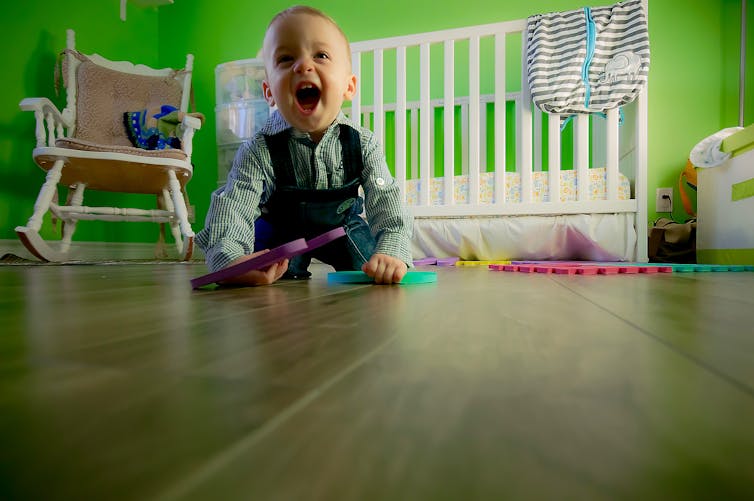January 9, 2018
With apartment living on the rise, how do families and their noisy children fit in?
A growing number of Australians live in apartments. The compact city model presents many benefits. However, living close to each other also presents challenges.
,
Rapid growth in apartment developments in recent decades has led to a . Households with children are on the front line of such tensions. They are one of the fastest-growing demographics living in apartments. Analysis of the latest census data show, for instance, that .
Apartment design and cultural acceptance of families in the vertical city have not kept pace with this shift in housing forms. Cultural expectations that families with children ought to live in detached houses are persistent. Apartment planners and developers reproduce these expectations by .
With childrenās sounds being difficult to predict or control, changing apartment demographics are an issue for planners and residents alike.

Trying to be good parents and good neighbours
My research explores the everyday experiences of families living in apartments in Sydney. It reveals that .
Apartment living often creates an emotional dilemma between being a good parent and being a good neighbour. Parents want to allow children to be children, but are ever anxious about annoying the neighbours.
Cities are layered with many different sounds, but the home is framed as a private space of peace and quiet. Sounds that intrude are considered noise. The āgoodā apartment neighbour avoids sounds that penetrate neighboursā homes.
This is near impossible when children are involved (particularly when apartments are poorly designed). Key pressure points include crying at night and playing and running during the day.
Parents spoke about the challenges of sleep training in an apartment. They wanted to be considerate neighbours, so felt anxious and guilty when their children did not comply. Some received angry letters from neighbours, or heard them call out and bang on walls and ceilings in midnight protests.
One mother described the difficult juggling act of an unsettled baby and an upset neighbour:
[The neighbour] called out ā¦ āPick up your baby!ā ā¦ I was so upset because we are trying our best and we were exhausted ourselves ā¦ [The neighbour] banged on the ceiling really loudly ā¦ I felt it on my feet, like it was shaking ā¦ That just kind of added to my stress ā¦ When I got back into bed after the shrieking finished and he [the baby] went back to sleep, and the stomping on the roof finished ā¦ I just said, āI donāt know if I can do that againā ā¦ knowing that, you know theyāre hearing it all of course, and we felt terrible.
Parenting anxieties were not limited to night-time. Monitoring kidsā play to minimise noise made parents feel like the āfun policeā.
I always feel like I am constantly telling them ānot in here, not in there, donāt do thatā ā¦ Iām constantly worried that we are annoying the neighbours. Because they are kids, they are loud. They donāt have a volume button.
Parents attempted many strategies for managing noise. These included putting down carpet and foam mats, restricting some activities to rooms without adjoining walls or to āsociableā hours, closing windows and covering air vents. The expectation that their childrenās sounds do not belong in apartments weighed heavily.
When he [the neighbour] first started complaining, Harry [son] was crawling. Imagine trying to teach a crawler that they are not allowed to crawl through the house ā¦ You know, he [the neighbour] wanted the impossible and got angry with us when we couldnāt deliver that for him, with no kind of seeming effort to understand where we were coming from ā¦
This familyās neighbour had written notes, aggressively banged on their walls and threateningly confronted the parents over their childrenās noise. The mother described feeling vulnerable and at a loss:
I feel like we have entered this entirely new area of discrimination that I had no idea existed before, but is actually quite prevalent among our peers. It is common among the mothers in my mothersā group ā¦ People just donāt like children and they donāt like childrenās noise ā¦ And you know parenting is hard ā¦ So to have the āOh my God I am pissing loads of people offā in the back of your mind as well ā¦ is really uncomfortable.
While not all families reported such negative experiences, almost all felt anxious about noise and had stories of friends who had experienced problems.
The sounds made by children were always front of mind. Aware of their neighboursā surveillance and (at times overt) moral judgments, they changed their domestic routines and modified their homes as much as possible.
People need apartments made for families
Broader changes are needed. Families living with children in apartments challenge norms that delineate the home as a place of quietude; that define āgood neighboursā as tranquil ones; and that position children as belonging elsewhere (detached houses). And they come up against such norms in dwellings that hamper their best efforts to regulate sound.
Families living in apartments actively pursue strategies for making everyday life āworkā. But there is only so much that individuals can change. The wider problem of apartmentsā poor acoustic design and performance persists. Both if the policy paradigm of urban consolidation is to have any hope of meeting the needs of a diverse population.
Read more:
, PhD Candidate in Human Geography,
This article was originally published on . Read the .
UOW academics exercise academic freedom by providing expert commentary, opinion and analysis on a range of ongoing social issues and current affairs. This expert commentary reflects the views of those individual academics and does not necessarily reflect the views or policy positions of the ¾«¶«“«Ć½ of ¾«¶«“«Ć½.
:format(jpg)/prod01/channel_3/assets/live-migration/www/images/content/groups/public/web/media/documents/mm/uow242469.jpg)